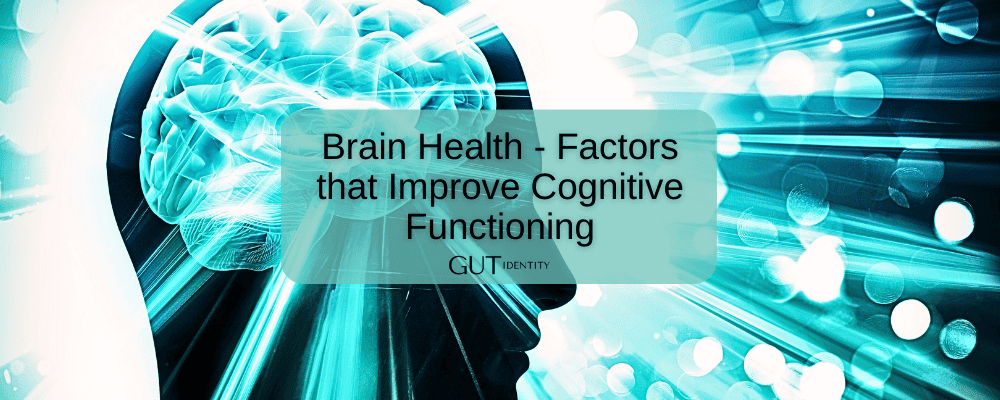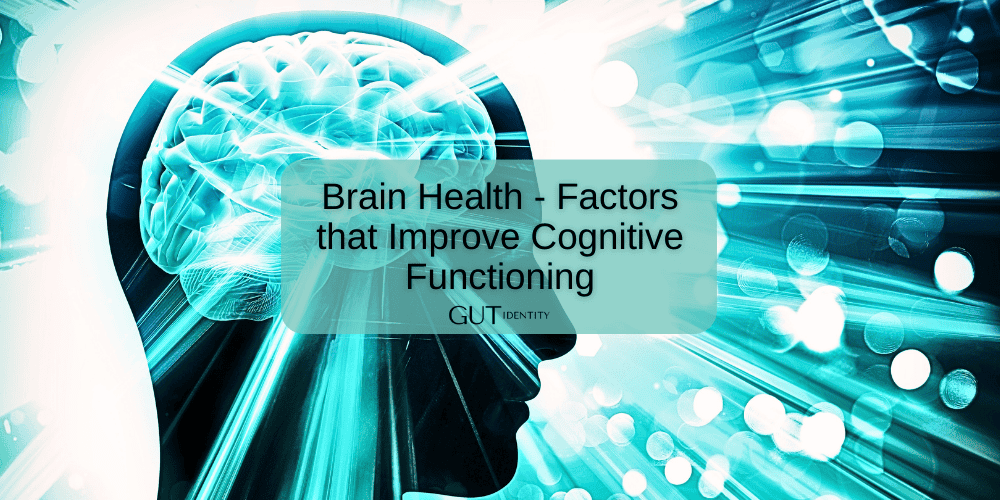
So, this blog initially started off as me writing very technical blogs about gut health etc. Now I focus more on basic lifestyle changes that we can do to improve our gut and brain health. Obviously, they are all intertwined so what goes in the gut affects the brain and other parts of the body.
Here are some simple ways, we can improve our brain health that will improve our cognitive functioning.
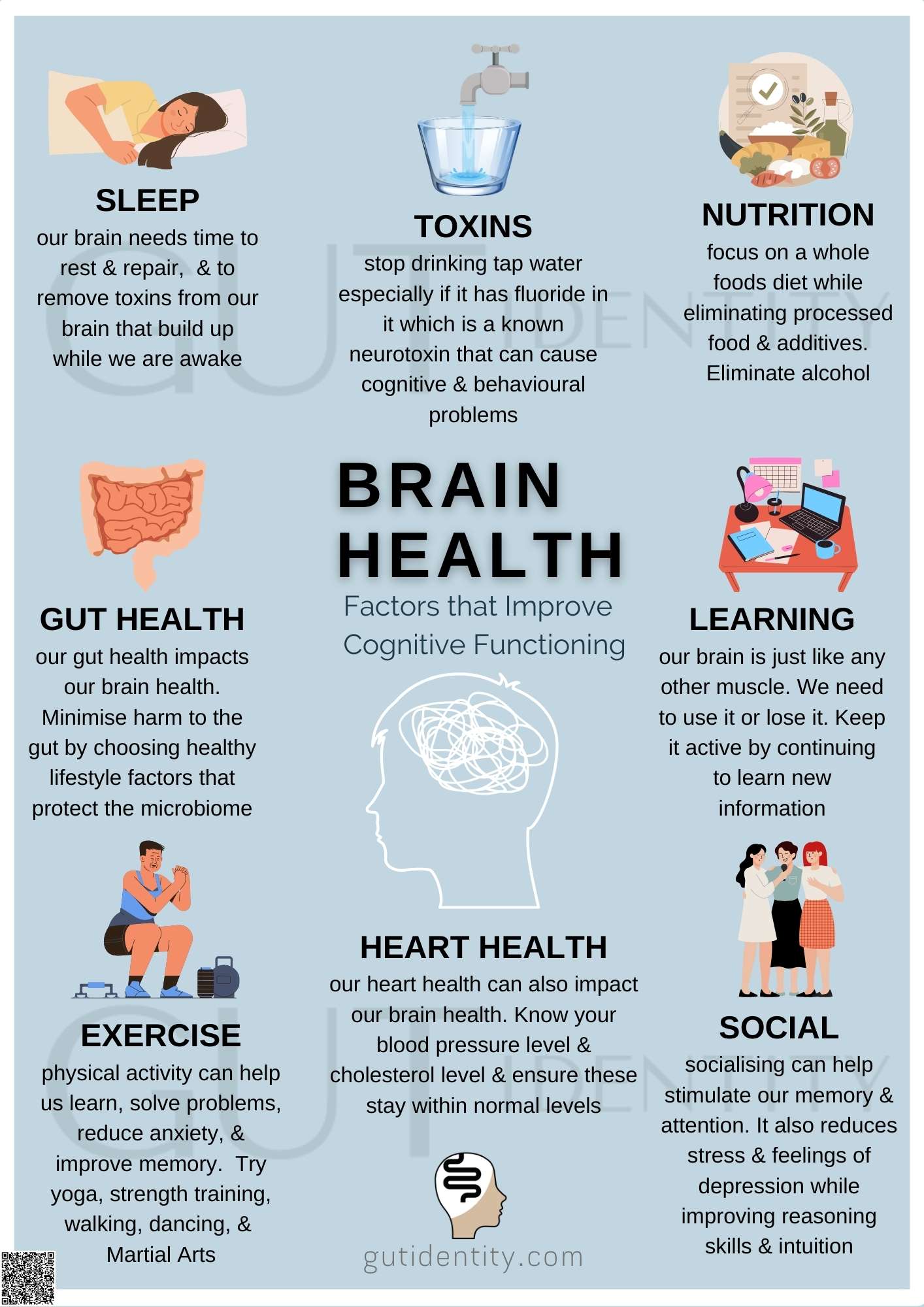
Let's start with nutrition to improve brain health and cognitive functioning
I used to say just reduce processed food. Now I’m literally yelling from the rafters to eliminate it altogether. The additives placed in our foods are like a slow form of poisoning. Don’t take it from me. Look up the numbers, names and codes you find on the backs of packets of processed food. IT WILL SHOCK YOU! We have to get into the habit of doing our own research.
Download the YUKA app and scan products to start learning about what’s in your food then you can make an informed choice whether to consume it or not.
The main way to avoid them altogether is to eat REAL food – this is also known as ‘whole foods’. This means they’re not created in a lab, or by a flavour chemist (research that term). They are from nature – the sea, the land. Eating close to nature means choosing fresh, whole foods like fruits, veggies, nuts, and unprocessed ingredients straight from the earth.
It’s about skipping the artificial stuff and enjoying food in its natural state, which not only tastes better but also fuels our bodies with real, nourishing goodness. The closer we eat to nature, the more energy we have, the better we feel, and the more connected we become to what truly sustains us.
It took me a while to get there but eliminating alcohol has been a massive step in the right direction for me. It’s a known neurotoxin and there is no safe limit currently known for the brain. Read more about this 2021 study HERE. My poor brain got hammered for a long period of time, always probably trying to correct itself and maintain balance. It didn’t take anything bad for me to stop, but it just felt like the right time, for my body, and also for where I’m at spiritually. I’m at a stage where I want my thinking to be a clear as possible all of the time.
Learning for brain health and improved cognition
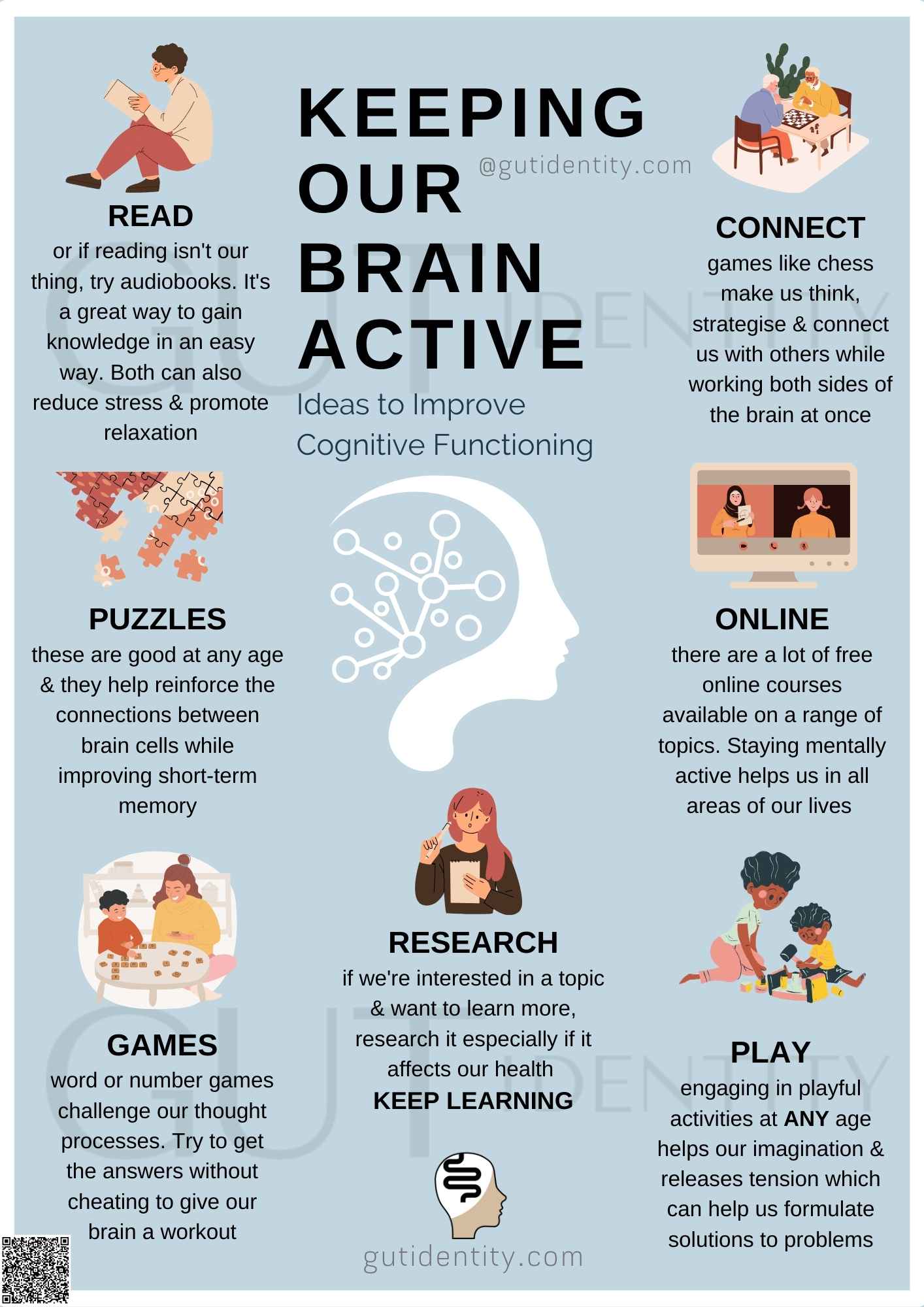
We need to keep our brain active. Sitting in front of the TV doesn’t keep it active. In fact it degrades it. I don’t think we were put on this earth to just be entertained. I feel we’re here to give something back. This process is hindered if we are just being entertained. Think bread and circuses! Go to work, Be entertained. Go to sleep. Go to work. ETC… Yeah, I think there’s more to life than that don’t you?!?
There are loads of free things we can do to keep the grey matter in tact. Search for free courses, listen to audio books, play games (not the mindless ones on the phone), play with kids, and most importantly, do research!
Social connection is important for our brain health and improved cognition
We are social creatures by nature. We thrive when we can learn off each other and support each other. There are many studies showing positive effects on the elderly in terms of their cognition and general health and well-being when they have continual exposure to others, especially children.
There was a BBC documentary brought out years ago that had a preschool visit a group of elderly residents in a nursing home. They all improved in multiple areas of their lives just by having the young children come and visit on a regular basis.
Staying socially connected is great for your brain because it keeps our mind active, sharp, and engaged. Conversations, shared experiences, and even laughter stimulate cognitive function, helping to strengthen memory and problem-solving skills. Social interactions also reduce stress and loneliness, which are linked to cognitive decline. Whether it’s chatting with a friend, joining a group, or simply spending time with loved ones, staying connected is a fun and natural way to keep our brain healthy and thriving.
Looking after our heart for a better brain
Now who would have thought these two were connected? But it turns out, they have far more in common than we might realise.
Heart health and brain health are closely linked because the brain relies on a strong, steady blood flow to function properly. When the heart is healthy, it efficiently pumps oxygen-rich blood to the brain, supporting memory, focus, and overall cognitive function. However, conditions like high blood pressure, high cholesterol, and heart disease can reduce blood flow, increasing the risk of strokes, dementia, and cognitive decline.
Taking care of our heart through regular exercise, a balanced diet, and healthy lifestyle choices also helps protect our brain, keeping it sharp and resilient as we age. We can do these things naturally by changing our environment without the need for pharmaceutical drugs. But I’m not a doctor so please seek medical advice if you are concerned about your health.
A Naturopath will also look into your environment and what can be changed for optimal health. I find Naturopaths are my go-to practitioner now as I’ve moved away from the old medical model of doing things.
Exercise our way to a healthier brain and clearer thinking
Regular physical exercise is a powerful way to enhance brain health. Engaging in activities like walking in nature, strength training, or swimming increases blood flow to the brain, delivering essential oxygen and nutrients that support cognitive functions such as memory and learning. Exercise also stimulates the release of brain-derived neurotrophic factor (BDNF), a protein that promotes the growth and survival of neurons, improving mental sharpness and resilience.
Consistent physical activity has been linked to a reduced risk of cognitive decline and neurodegenerative diseases like Alzheimer’s. Incorporating regular exercise into our routine not only benefits our body but also significantly boosts our brain’s health and performance.
Check out a recent 2024 article examining the relationship between exercise and boosting memory and thinking skills HERE.
I do a lot of exercise which includes, daily walking in nature, martial arts, and daily strength training. These definitely help keep me fit but also help me reset and focus my thinking.
Here are some ways strength training is important for our brain and body:
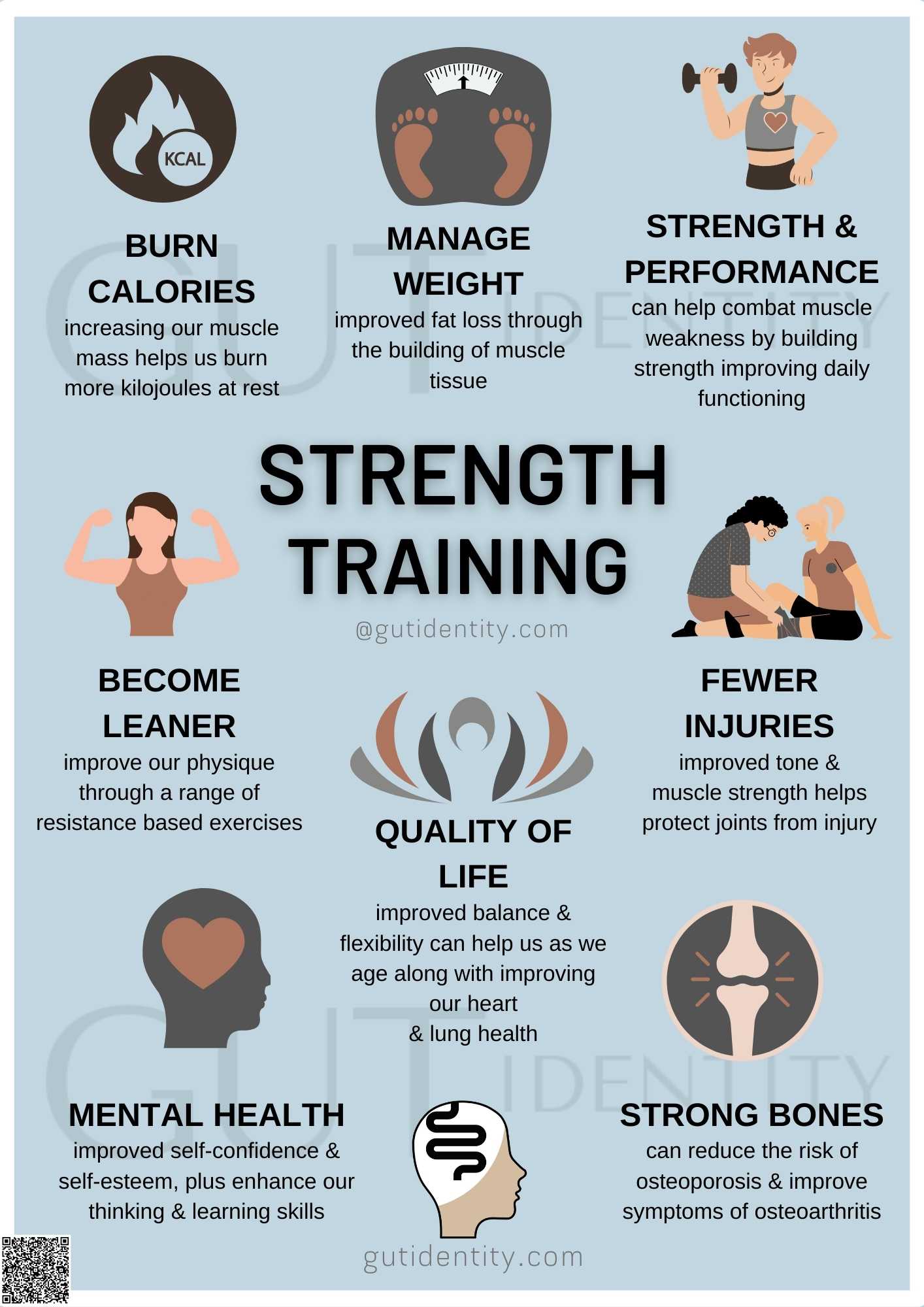
Improving gut health for a better brain (and one that's less inflamed)
I know from personal experience what an inflamed brain feels like. It feels like a brain on fire! I also know what severe brain fog feels like too as I experienced this while very sick when I first got Coeliac Disease.
But once I cleaned up my diet and treated my gut with respect, along with lifestyle changes, my health dramatically changed. And it’s only gotten better as I’ve improved even more and eliminated all additives from my diet including eliminating alcohol.
Related post
As I found out, our gut health plays a crucial role in brain health through the gut-brain connection, often called the “gut-brain axis.” The gut is home to trillions of bacteria that help regulate digestion, immune function, and even mood and cognition.
A healthy gut microbiome produces neurotransmitters like serotonin, which influence our mood and mental well-being. Imbalances in gut bacteria have been linked to anxiety, depression, and even neurodegenerative diseases. I was unhappy and moody for years but after healing my gut, my emotions are stable and I’m the happiest I’ve ever been. There’s a lot to be said to fixing the gut first hence why the tagline for my Brand Gutidentity is – Discover the First Brain.
The best way we can support our gut health is to eat a whole food diet rich in fibre, probiotics, and healthy fats that support gut health, which in turn helps keep the brain functioning at its best. Cut out all artificial crap as it’s not actually food. By doing this, thinking becomes clearer and sharper and this is what I experienced first hand.
We need quality sleep for brain health and cognition
Getting good sleep is like hitting the reset button for your brain. While we sleep, our brain clears out toxins, strengthens memories, and gets us ready to think clearly the next day. Without enough rest, we might feel foggy, forgetful, and easily distracted. Long-term sleep problems can even increase the risk of brain diseases like Alzheimer’s. Try to aim for 7-9 hours of quality sleep each night to keep our brain sharp, boost our mood, and stay focused.
One way to help our sleep is to create a solid bedtime routine and a regular sleep schedule. I don’t have screens after 7pm and usually wind down for around 1.5 hours before going to sleep. I exercise early which helps to not hype me up, and I eat early as well so I’m not going to sleep on a full stomach. I also do meditation, practise gratitude and listen to short video clips of positive, spiritual info before going to sleep. I fall asleep to binaural beats which runs for over an hour as I don’t like silence when trying to fall asleep. This relaxes me and helps me fall asleep naturally.
I do this every night even on the weekends. Let’s just say I’m pretty boring these days but I’m grateful for the clearer head and my thinking is super sharp because of it.
Reducing the toxic load on our body helps our brain health and pineal gland
Reducing the toxic load on our body helps our brain and pineal gland by minimising exposure to harmful chemicals that can interfere with cognitive function and hormone regulation. The pineal gland, which regulates sleep through melatonin production, is especially sensitive to toxins like heavy metals, pesticides, and fluoride, which may contribute to calcification and reduced function.
The following paragraph was taken directly from ChatGPT. Boy oh boy have things changed 
‘Fluoride, commonly found in tap water and dental products, has been linked to potential negative effects on brain health. Some studies suggest that excessive fluoride exposure may contribute to lower IQ levels, neurodevelopmental delays in children, and cognitive decline in adults. Fluoride can accumulate in the brain and pineal gland, potentially disrupting sleep, hormone regulation, and overall cognitive function. While small amounts are considered safe, long-term exposure to high levels may pose risks. Reducing fluoride intake by using filtered water and fluoride-free products can help support brain health and overall well-being.’
For more information on fluoride, please check out this website
which has a great amount of information and peer reviewed research on it. Be informed! For me, it’s worth paying for water because I don’t want the fluoride exposure. I haven’t drunk tap water for over 5 years now.
Detoxing through a clean diet, staying hydrated, exercising, and avoiding processed foods and environmental toxins can support brain clarity, improve sleep, and enhance overall mental well-being. Keeping our body as toxin-free as possible helps our brain stay sharp and our pineal gland function optimally.
Bottom line
Supporting brain health through lifestyle changes can significantly improve our cognitive function and overall well-being. Regular exercise boosts blood flow and stimulates brain growth, while a whole food diet, nourishes brain cells. Prioritising quality sleep allows our brain to repair and consolidate memories, while reducing exposure to toxins, including fluoride, helps protect brain function and the pineal gland.
Managing stress, staying socially connected, and engaging in lifelong learning also enhance mental sharpness.
By making these healthy choices, we can keep our brain strong, focused, and resilient throughout life. Trust me when I say, if I can do it, anyone can
Disclaimer: This is not a substitute for medical advice. Please seek professional medical advice if you’re concerned about your health and do your own research so you know what’s happening to your body so you can use informed consent appropriately.

